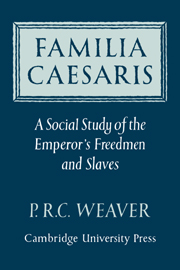Book contents
- Frontmatter
- Contents
- Preface
- Abbreviations
- INTRODUCTION
- PART I NOMENCLATURE AND CHRONOLOGY
- PART II THE FAMILY CIRCLE
- PART III THE EMPEROR'S SERVICE
- 12 Vicarii
- 13 Liberti servus and liberti libertus
- 14 ‘Vicariani’
- 15 The occupational hierarchy: some points of method
- 16 Sub-clerical grades
- 17 Adiutores: junior clerical grades
- 18 Intermediate clerical grades
- 19 Senior clerical grades
- 20 Senior administrative grades: a rationibus, ab epistulis, etc.
- 21 Freedman procurators
- 22 Imperial freedmen and equestrian status: the father of Claudius Etruscus
- CONCLUSION
- APPENDIXES
- Bibliography
- Index
- Frontmatter
- Contents
- Preface
- Abbreviations
- INTRODUCTION
- PART I NOMENCLATURE AND CHRONOLOGY
- PART II THE FAMILY CIRCLE
- PART III THE EMPEROR'S SERVICE
- 12 Vicarii
- 13 Liberti servus and liberti libertus
- 14 ‘Vicariani’
- 15 The occupational hierarchy: some points of method
- 16 Sub-clerical grades
- 17 Adiutores: junior clerical grades
- 18 Intermediate clerical grades
- 19 Senior clerical grades
- 20 Senior administrative grades: a rationibus, ab epistulis, etc.
- 21 Freedman procurators
- 22 Imperial freedmen and equestrian status: the father of Claudius Etruscus
- CONCLUSION
- APPENDIXES
- Bibliography
- Index
Summary
From the point of view of legal status or legal capacity the most notable differentiation within the slave section of society is between the slave who forms part of another slave's peculium, i.e. is his de facto property, the servus vicarius, and other slaves. Slave-owned slaves were fairly numerous in Roman society. Such wide differences of wealth and position existed among different kinds of slaves that inevitably the wealthier and more important slaves, with their master's consent, acquired slaves of their own whether for their personal use or to aid them as deputies in their master's service.
The Roman terminology for the slaves of slaves is not without significance. ‘Servus servi’, on the Greek model of δοῦλος δούλου, is very rare in the literary, legal and epigraphical sources, as is ‘servus peculiaris’. The usual term is ‘(servus) vicarius’ which is derived, as is much of the domestic terminology of Roman slavery, from military usage and organisation. It originally meant ‘substitute’ or ‘replacement’ (vices agens). The owner-slave is called ‘ordinarius’, regularly in the legal texts but only occasionally elsewhere. In the inscriptions his status is usually obvious from the nomenclature of the vicarius and needs no special definition; e.g. VI 64 = D 3502: Venustus Philoxeni Ti. Claudi Caesaris servi dispensatoris vicarius. The slave vicarius could be:
(i) a replacement, deputy or auxiliary of a slave official;
(ii) a personal slave of another slave irrespective of function or skill.
- Type
- Chapter
- Information
- Familia CaesarisA Social Study of the Emperor's Freedmen and Slaves, pp. 200 - 206Publisher: Cambridge University PressPrint publication year: 1972



